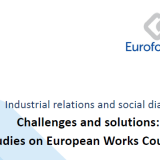
Arbeidsverhoudingen
Vakbonden, werkgeversorganisaties en de overheid spelen allemaal een rol in het beheer van de arbeidsrelaties. Ze zijn geschakelde onderdelen van een stelsel dat op Europees, nationaal, sectoraal, regionaal en bedrijfsniveau opereert. In de afgelopen jaren zijn de arbeidsverhoudingsstelsels, naarmate de technologie en vormen van werk binnen een voortdurend veranderende economische omgeving evolueren, met kritieke uitdagingen geconfronteerd.
Tegen deze achtergrond heeft de Europese Commissie in 2015 een ‘nieuwe start’ voor de Europese sociale dialoog gelanceerd. In juni 2016 hebben de Commissie, de Raad en de sociale partners in een gezamenlijke verklaring de fundamentele rol van de sociale dialoog als belangrijk onderdeel van de vorming van het Europees werkgelegenheids- en sociaal beleid onderstreept.
- Europese Commissie: Gezamenlijke verklaring over een nieuwe start voor de sociale dialoog





























